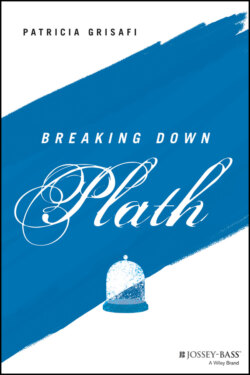Читать книгу Breaking Down Plath - Patricia Grisafi - Страница 13
A TURNING POINT
ОглавлениеIn 1953, Plath's life took a series of twists that would ultimately lead to a suicide attempt. Aside from academic success (Plath was elected to Phi Beta Kappa and also learned she would be the editor of the Smith Review for her senior year), Plath won a guest editorship position at Mademoiselle magazine, which she held during the summer at its New York City offices. She and other winners were put up at a women's‐only hotel, The Barbizon, and were expected to fulfill their duties as well as put forward a positive face representing the magazine while touring the city.
Plath drew inspiration from this experience in her only published novel, The Bell Jar (1963). Aside from the novel, some letters, and scant journal entries, we don't know a lot about this time during Plath's life from Plath's own perspective. However, once she finished her editorship, returned home, and received a rejection from a Harvard University writing program she desperately wanted to take, her mental health seemed to take a dive.
Facing a long stretch of summer vacation at home with her mother and nothing to look forward to, Plath fell into a deep depression that was so severe it had physical effects. Unable to sleep, read, or write, Plath reached out for help. Her mother took her to a male psychiatrist, and that psychiatrist gave her improperly administered electroconvulsive therapy (ECT). In The Bell Jar, Plath would compare the experience to how one must feel being electrocuted and tortured. This event would haunt Plath and her writing for the rest of her life, coming up again and again as an image and metaphor in her poetry.
Plath's condition continued to deteriorate. On August 24, 1953, Plath consumed a bottle of pills and hid in a crawlspace in the basement. She was unconscious for two days, during which an exhaustive search took place throughout the greater Boston area. Her disappearance made the newspapers: “Beautiful Smith Girl Missing at Wellesley,” read the headline of The Boston Daily Globe. “Mrs. Aurelia S. Plath, of 26 Elmwood Street, said her daughter apparently left the house at 2 p.m., leaving a note saying she was ‘taking a long walk’ and would ‘be back tomorrow.’”
Plath was found in the crawlspace with injuries to her face from hitting her head. She was treated and hospitalized at McLean Hospital, a private hospital in Boston renowned for its psychiatry program. Plath's Smith College benefactor Olive Higgins Prouty helped pay for most of Plath's care. Prouty herself had suffered a nervous breakdown and could relate to Plath's struggles. As part of her treatment, Plath received regular therapy sessions, which she found beneficial, with Dr. Ruth Barnhouse Beuscher. She received ECT again, but this time it was administered correctly and actually helped Plath's depression. Plath's work with Dr. Beuscher gave her the tools she needed to manage her mental health and eventually return to school. The two of them would remain in contact for the rest of Plath's life.
Figure 1.1 Plath at the beach, 1954.
Source: Bridgeman Images
After her recovery, Plath threw herself back into college life with fervor—and started to hone her skills and develop the poetic voice that would earn her a respected place in American literature. She finished her college education with high honors and received a Fulbright Scholarship, which would allow her to study English at Newnham College, Cambridge University. She would seek further education abroad, which was not the norm for women during this time.
As an American in England during the 1950s, Plath experienced culture shock—her brash Americanness sometimes uncomfortably set her apart. Acquaintance Jane Baltzell remembered Plath seemed “totally unaware of how her American behavior and talk seemed rather comic to the British” (Wilson, 2013, p. 292). However, she was also exposed to new poets who greatly influenced her—including her future husband Ted Hughes. She had to adjust to a new way of life, a new educational system, and a new set of expected behaviors.
